Suchergebnisse
Fassadenintegrierte modulare Split-Wärmepumpe für Neubau und Sanierung (FiTNeS)
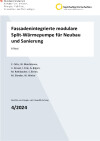
Das Ziel von FitNeS war die Entwicklung von modularen Split-Wärmepumpen mit sehr kompakten fassadenintegrierten Außeneinheiten für die Verwendung zur wohnungsweisen Heizung und Trinkwarmwasserversorgung. Einerseits soll eine modulare Bauweise mit einem hohen Grad an Vorfertigung ermöglicht werden und andererseits soll die architektonische Gestaltung und ein ansprechendes Design besondere Berücksichtigung finden. Eines der wesentlichen Entwicklungsziele ist die Minimierung der Schallemissionen durch eine optimierte Strömungsführung.
Schriftenreihe
4/2024
F. Ochs, W. Monteleone, C. Drexel, J. Fink, G. Bilgeri, M. Rothbacher, S. Breier, M. Elender, W. Winter
Herausgeber: BMK
Deutsch, 67 Seiten
Downloads zur Publikation
Effiziente, kostengünstige und wartungsfreundliche zentrale Mehrfamilienhaus-Lüftungsanlagen – Planung, Betrieb und Brandschutz (E.Vent)
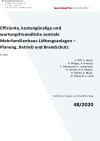
Ziel des Projekts war es, innovative technische Lösungen und Planungshilfen für eine kostengünstige Umsetzung und einen energieeffizienten und wartungsarmen Betrieb von zentralen Wohnraumlüftungssystemen zu erarbeiten. Dabei wurde ein starker Fokus auf das Thema Brandschutz und Balanceabgleich gelegt.
Schriftenreihe
48/2020
S. Öttl, C. Speer, R. Pfluger, A. Knotzer, C. Obmascher, E. Lamprecht, H. Gstrein, H. K. Malzer, H. Reichl, A. Music, D. Edwards, L. Lepp
Herausgeber: BMK
Deutsch, 122 Seiten
Downloads zur Publikation
Vakuumglas-Kastenfenster: Performance-Monitoring in Sanierungsprojekten (VAMOS)
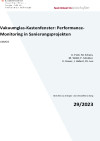
Fortsetzung und Vertiefung der Sondierung VIG_SYS_RENO zum Einsatz von Vakuumglas in Kastenfenstern für Zwecke der energetischen Optimierung von solchen Konstruktionen für Sanierungszwecke / Bestandsertüchtigung; Als Ergebnis werden vertiefte Kenntnisse über den Einsatz von hochwärmedämmenden Vakuumgläsern via Simulation und Einbau/Monitoring in Realsituation erarbeitet.
Schriftenreihe
29/2023
U. Pont, M. Schuss, M. Wölzl, P. Schober, K. Hauer, J. Haberl, Ch. Lux
Herausgeber: BMK
Deutsch, 147 Seiten
Downloads zur Publikation
DW² - Entwicklung einer thermisch verbesserten Schlitzwandkonstruktion
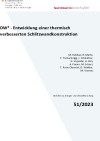
Die thermischen Eigenschaften von Schlitzwandkonstruktionen werden durch die Anwendung neuer Materialien und Herstellungsmethoden verbessert und durch Labor- und Feldversuche validiert sowie durch numerische und ökologische Betrachtungen ergänzt. Das Ergebnis kann bei der Errichtung von energetisch verbesserten unterirdischen Bauwerken wie beispielsweise Tiefgaragen oder zur Herstellung von Erdwärmespeichern verwendet werden.
Schriftenreihe
51/2023
M. Rebhan, R. Marte, F. Tschuchnigg, J. Schleicher, G. Vojvodic, H. Kim, A. Passer, M. Scherz, T. Potrc Obrecht, G. Winkler, M. Vremec
Herausgeber: BMK
Deutsch, 55 Seiten
Downloads zur Publikation
Potenzial der ökologischen Optimierung technischer Gebäudeausrüstung durch den Einsatz biogener Materialien (BiBi-TGA)
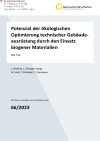
Erhebung des Substitutionspotenzials herkömmlicher Komponenten der technischen Gebäudeausrüstung durch biogene Materialien. Ziel war die Generierung neuer Daten zum ökologischen Verbesserungspotenzial des Einsatzes biogener Ressourcen in der technischen Gebäudeausrüstung in Bürogebäuden. Anhand von LCA-Screenings und Untersuchungen der technischen Umsetzbarkeit wurden die Potenziale analysiert.
Schriftenreihe
66/2023
J. Weithas, L. Eitzinger-Lange, M. Leeb, T.Schnabel, F. Coosmann
Herausgeber: BMK
Deutsch, 60 Seiten
Downloads zur Publikation
Einsatz von Augmented Reality zur Abnahme und Qualitätssicherung auf Baustellen (AR-AQ-Bau)
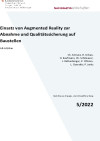
Ziel dieses Forschungsprojektes ist die Entwicklung eines baustellentauglichen Augmented-Reality-(AR)-Systems inklusive eines Remote-Expert-System und eines BIM-Closed-Loop Datenübertragungssystem zur Verbesserung der Bauqualität, Gebäudesicherheit und Energieeffizienz sowie zur Effizienzsteigerung im Baucontrolling.
Schriftenreihe
5/2022
Ch. Schranz, H. Urban, H. Kaufmann, Ch. Schönauer, J. Rattenberger, P. O’Brien, L. Ozeraitis, P. Jaritz
Deutsch, 62 Seiten
Downloads zur Publikation
Gamification als Möglichkeit für die Generierung von Daten zur energieorientierten Quartiersplanung (HotCity)
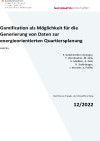
Ziel des Projekts war ein Funktionstest, ob durch Gamification kosteneffizient, rasch und zuverlässig ein aktueller Datensatz von energierelevanten Daten zur Quartiersplanung erhoben werden kann. Dies wurde am Beispiel der Potenzialermittlung von industriellen und gewerblichen Abwärmequellen in Wien und Graz ermittelt.
Schriftenreihe
12/2022
E. Gebetsroither-Geringer, T. Wernbacher, M. Göls, E. Meißner, A. Graf, R. Stollnberger, J. Worster, A. Peiffer
Herausgeber: BMK
Deutsch, 157 Seiten
Downloads zur Publikation
FEELings - User Feedback for Energy Efficiency in Buildings
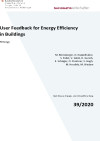
Der Energieverbrauch von Gebäuden wird maßgeblich durch das Verhalten von NutzerInnen beeinflusst. In diesem Forschungsprojekt wird ein neuartiges User-Feedbacksystem untersucht. NutzerInnen geben Feedback zur empfundenen Raumqualität. Auf Basis des Feedbacks werden Einstellungen an der Gebäudetechnik zur Energieeffizienz- und Komfortsteigerung optimiert. Der Proof-of-Concept für dieses neuartige System wird anhand von zwei Use-Cases erbracht.
Schriftenreihe
39/2020
M. Monsberger, D. Koppelhuber, S. Pabst, V. Sabol, H. Gursch, E. Schlager, O. Prentner, S. Singh, M. Herzlieb, M. Wedam
Herausgeber: BMK
Deutsch, 80 Seiten
Downloads zur Publikation
LINE-FEED: Plug-in Photovoltaik-Speicher für die Steckdose
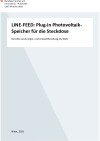
Im Projekt LINE-FEED wurden Technologien entwickelt, die für einen Photovoltaik-Speicher benötigt werden, der von jedem Laien an einer gewöhnlichen Steckdose angeschlossen werden kann. Ziel war die Entwicklung eines Speichersystems für Haushalte in urbanen Räumen, welche selbst keine Möglichkeit der Installation einer Photovoltaikanlage haben.
Schriftenreihe
45/2025
Christoph Grimmer, Patrick Salcher, Stephan Weinberger, Zlatko Bonjic, Klaus Krischan
Herausgeber: BMIMI
Deutsch, 32 Seiten
Downloads zur Publikation
Forschungsinitiative „Zukunftssicheres Bauen“ – Phase 2 (2015–2018)
Ziel der Forschungsinitiative „Zukunftssicheres Bauen“ ist die Untersuchung ganzheitlicher Aspekte nachhaltigen Bauens als Beitrag zur zukunftsfähigen Weiterentwicklungen von Produkten und Dienstleistungen der Unternehmen der Stein- und keramischen Industrie. Die ÖGUT begleitet die Forschungsinitiative des Fachverbands der Stein- und keramischen Industrie und stellt den Ergebnistransfer zum Forschungsprogramm "Stadt der Zukunft" sicher.
Coole Fenster - Fenster mit Beschattung im Spannungsfeld sommerliche Überwärmung, Tageslicht und winterlicher Wärmeschutz in der Klimakrise
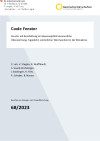
Das Fenster und dazugehörige Komponenten wie Sonnen- oder Blendschutz werden als einheitliches Haustechnikelement hinsichtlich unterschiedlicher jahreszeitlicher Erfordernisse bzw. im Hinblick auf die Klimakrise optimiert. Die Ergebnisse dienen als Grundlage für Neuentwicklungen in der Fenster- und Verschattungstechnik, um sommerlichen wie winterlichen Wärmeschutz bei gleichzeitiger Gewährleistung einer ganzjährigen ausreichenden natürlichen Belichtung sicherzustellen.
Schriftenreihe
68/2023
C. Leh, V. Stiegler, R. Wolffhardt, S. Vavrik-Kirchsteiger, J. Bachinger, H. Ferk, P. Schober, B. Nusser
Herausgeber: BMK
Deutsch, 182 Seiten
Downloads zur Publikation
PVOPTI-Ray: Optimierung reflektierender Materialien und Photovoltaik im Stadtraum bezüglich Strahlungsbilanz und Bioklimatik
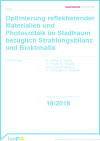
Im Rahmen des Projektes PVOPTI-Ray wurde der Einfluss der Reflexion und der Strahlungsbilanz in städtischem komplexem Gelände auf die Performance von fassadenintegrierter Photovoltaik (PV) untersucht. Ebenso wurde der Einfluss der Solarmodule und der Strahlungswandlung an Solarmodulen auf das Stadtklima analysiert.
Schriftenreihe
18/2018
P. Weihs, S. Zamini, S. Krispel, S. Oswald, M. Peyerl, M. Revesz, A. Schneider, H. Trimmel
Herausgeber: BMVIT
Deutsch, 98 Seiten
Downloads zur Publikation
Entwicklung von Klett-Befestigungssystemen für die Technische Gebäudeausrüstung (Klett-TGA)
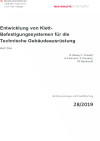
Ziel dieser Sondierung ist eine Systemveränderung bei der Montage der TGA, welche zukünftig einen universelleren Einsatz von Klett ermöglicht.
Schriftenreihe
28/2019
R. Riewe, F. Oswald, A. Pavicevic, Z. Kresevic, M. Raudaschl
Herausgeber: BMVIT
Deutsch, 78 Seiten
Downloads zur Publikation
Sanierung von Gründerzeitkellern zu Wohnungen mit hoher Lebensqualität und minimalem Energieverbrauch (SPACE4free)
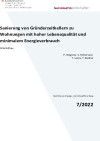
Planung von dauerhaften und schadensfreien Wohnungen mit hoher Lebensqualität und minimalem Energieverbrauch in Souterrainbereichen feuchtebelasteter Keller von Gründerzeithäusern. Durch den Einsatz von innovativen Lüftungssteuerungen wird ein behagliches Raumklima erzeugt. Gleichzeitig wird die Toleranz gegenüber unterschiedlichen Nutzungsarten gewährleistet. Ein Planungstool ermöglicht die Skalierung der Erkenntnisse und somit die Anwendbarkeit auf verschiedenste Planungssituationen.
Schriftenreihe
7/2022
P. Wegerer, S. Hinterseer, T. Lewis, T. Bednar
Herausgeber: BMK
Deutsch, 163 Seiten
Downloads zur Publikation
URBAN STRAW - Brandschutztechnische Konditionierung von Einblas-Stroh zur Gebäudedämmung der urbanen Gebäudeklassen 4 und 5
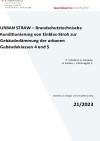
Entwicklung einer Brandschutzausrüstung von Strohhäcksel-Einblasdämmung zur Erzielung der Schwerentflammbarkeit anhand biogener Flammschutzmittel materialverwandter Stoffe und deren Applikationsverfahren. Anwendung des Materials als thermische Gebäudedämmung bei der Vorfertigung materialreduzierter Holzbauelemente für die urbanen Gebäudeklassen 4 und 5 mit bis zu 6 Geschossen.
Schriftenreihe
21/2023
P. Schubert, A. Korjenic, H. Fischer, I. Kirchengast, F. Hahn
Herausgeber: BMK
Deutsch, 76 Seiten
Downloads zur Publikation
Freiformflächen-Tageslichtsysteme für Fassaden und Oberlichter (FFF-TaliSys)
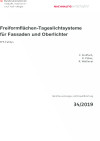
Im Rahmen von FFF-TaliSys wurden neuartige Tageslichtsysteme auf Basis der Freiformflächentechnologie erarbeitet und bis zu Funktionsmustern weiterentwickelt. Innovative Systeme sollen die widersprüchlichen Anforderungen an Tageslichtsysteme bestmöglich lösen.
Schriftenreihe
34/2019
C. Knoflach, D. Plörer, R. Weitlaner
Herausgeber: BMVIT
Deutsch, 47 Seiten
Downloads zur Publikation
PowerShade – Entwicklung stromgenerierender Beschattungslösungen für energieflexible Gebäude im urbanen Raum
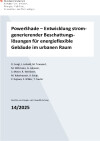
Ziel des Projektes "PowerShade" war die Entwicklung von kostengünstigen und universell einsetzbaren stromgenerierenden Beschattungslösungen, welche durch intelligente Regelung gekoppelt mit künstlicher Intelligenz eine Steigerung der Energieflexibilität von Gebäuden im urbanen Raum ermöglichen.
Schriftenreihe
14/2025
D. Sengl, J. Leibold, M. Trampert, M. Wittmann, G. Lukasser, S. Moser, R. Weitlaner, M. Kobelrausch, A. Estaji, Z. Kujawa, S. Wilker, T. Sauter
Herausgeber: BMK
Deutsch, 62 Seiten
Downloads zur Publikation
Cooling LEC – Energieflexible Gebäude durch Steuerung von Kühlanlagen über unidirektionale Kommunikation in Local Energy Communities
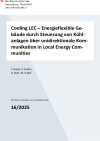
An das Stromsystem (insbesondere an das Verteilnetz) werden in Folge des Klimawandels und des Temperaturanstieges insbesondere durch den Anstieg aktiver Kühlsysteme vor allem auf Niederspannungsebene neue Herausforderungen gestellt. Durch die hohe elektrische Leistung von aktiven Kühlaggregaten und die hohe Dichte an Anlagen, die mitunter unkoordiniert und zu ungünstigen Zeitpunkten betrieben werden, entstehen Verbrauchsspitzen im System. Das Projekt Cooling LEC weist daher als übergeordnetes Ziel die Entwicklung und Demonstration einer zentralen Steuerung / Intelligenz von dezentralen aktiven Kühlanlagen über eine Weiterentwicklung der unidirektionalen Kommunikation von Rundsteueranlagen zur Schaffung energieflexibler Gebäude im Sinne des neuen Ansatzes der "Local Energy Communities” durch Schaffung eines "Sondertarifs"aus. Rundsteueranlagen sind seit vielen Jahrzehnten etabliert und bei allen Energieversorgern vorhanden sowie bewährt. Das Upcsaling-Potential ist sehr groß.
Schriftenreihe
16/2025
T. Nacht, R. Pratter, N. Bisko, M. Kröpfl
Herausgeber: BMIMI
Deutsch, 54 Seiten
Downloads zur Publikation
mAIntenance – Untersuchung von KI gestütztem Instandhaltungs- und Energiemanagement
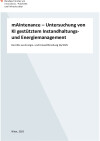
Optimierter & zuverlässiger Betrieb von Heizungs-, Lüftungs-, Klima- und Kältetechnik (HLKK) Anlagen hinsichtlich Instandhaltungs- und Energiemanagement mittels prädiktiver, datenbasierter & selbstlernender Fehlererkennung. Konzeptioneller Entwurf und prototypische Implementierung eines KI (Künstliche Intelligenz)-Tools zur automatisierten Datenanalyse und Empfehlungsgebung für das technische Gebäudemanagement.
Schriftenreihe
46/2025
Jerik Catal, Fabrizia Giordano, Jan Kurzidim, Michael Schöny, Miloš Šipetić, Thomas Lachmayer, Anna Maria Nujic
Herausgeber: BMIMI
Deutsch, 75 Seiten
Downloads zur Publikation
greening UP! Nachhaltige Grünpflege, Wartung, Instandhaltung von Vertikalbegrünungen inklusive rechtlicher Aspekte
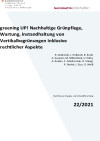
Im Projekt wurden aufbauend auf umfassenden Erhebungen und Analysen von bestehenden vertikalen Gebäudebegrünungen in Außenräumen (boden- und systemgebundene Fassadenbegrünungen) und vertikalen Innenraumbegrünungen passgenaue Grünpflege-, Wartungs- und Instandhaltungskonzepte erarbeitet und rechtliche Aspekte adressiert. Der "greening UP!"-Wissenspool mit konkreten Empfehlungen und anschaulich aufbereitetem Wissen sowie die Konzeption eines digitalen Tools zur "Ersten Grünen Hilfe" runden das Projekt ab.
Schriftenreihe
22/2021
R. Dopheide, J. Hollands, B. Knoll, A. Korjenic, M. Mitterböck, U. Pitha, A. Renkin, F. Schiefermair, R. Stangl, P. Skolek, I. Süss, O. Weiß
Herausgeber: BMK
Deutsch, 162 Seiten
